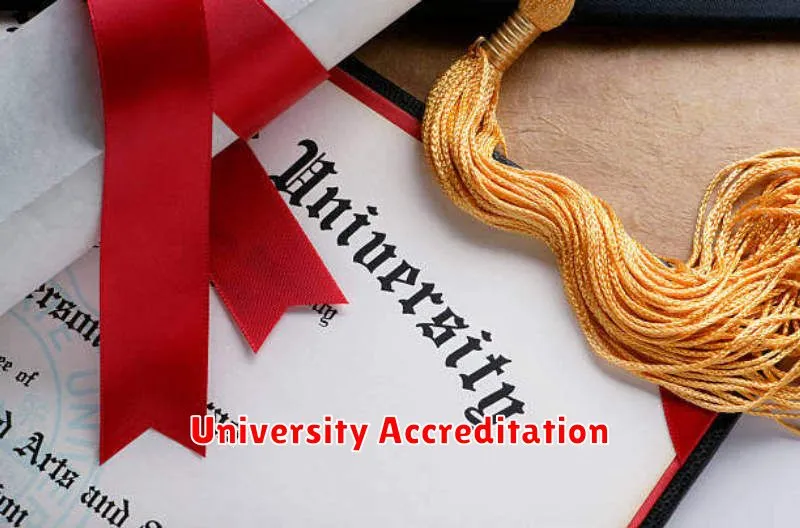In the realm of higher education, university accreditation serves as a critical benchmark for assessing the quality and standards of educational institutions. This process not only ensures that universities meet established educational criteria but also guarantees students receive an education that meets industry expectations. With a multitude of accrediting bodies and accreditation standards, understanding the intricacies of the accreditation process is essential for students, faculty, and education administrators alike. In this article, we will delve into the importance of accreditation, how it influences university operations, and what potential students must consider when choosing a credible institution for their academic journey. Whether you are a prospective student or an educational professional, grasping the nuances of university accreditation is fundamental for navigating the world of higher education.
Definition and Importance of Accreditation
Accreditation is a vital process through which educational institutions, particularly universities, are evaluated by an external body. This evaluation ensures that the institution meets specific standards of quality and rigor in its academic offerings. Accreditation is not just a cursory or symbolic gesture; it is a comprehensive assessment that examines various aspects such as the curriculum, faculty qualifications, student support services, and facilities.
The importance of accreditation cannot be overstated. Firstly, it serves as a seal of credibility and trust. Students and parents can rely on accredited institutions to provide a level of education that meets or exceeds national and sometimes international standards. Furthermore, accreditation is often a prerequisite for students who wish to transfer credits between institutions or pursue higher education.
Additionally, accreditation plays a crucial role in eligibility for certain financial aids or scholarships, as many federal and state funds require enrollment in accredited programs. Employers also often regard degrees from accredited institutions more favorably during hiring processes, understanding that these graduates have received a quality education. Therefore, accreditation is not only a measure of educational quality but also an essential component in promoting student success and institutional reputation.
Types of Accreditation (Regional vs National)
Understanding the distinction between regional and national accreditation is crucial for students considering higher education options. Both types serve to assess the quality and standard of educational institutions in the United States, but they do so in different ways and hold different levels of prestige.
Regional accreditation is often considered more prestigious and is awarded by accrediting agencies divided into six different regions of the U.S. These agencies evaluate institutions as a whole, providing a comprehensive review of a university’s academic programs, administration, and student services.
In contrast, national accreditation typically applies to specific types of institutions, such as technical schools, vocational schools, and certain online universities. This type of accreditation focuses more on specialized education and training programs.
The choice between attending a regionally or nationally accredited institution can impact credit transferability and eligibility for certain graduate programs. Generally, credits and degrees from regionally accredited schools have wider acceptance. Therefore, students should carefully consider how the type of accreditation may affect their educational and career goals.
Check Accreditation Status Before Applying

Before committing to a university, it’s critical to verify its accreditation status. Accreditation ensures that the institution meets specific standards of quality and that its degrees will be recognized by employers and other educational entities.
There are various accrediting bodies, and each holds different weight depending on the region and field of study. Knowing which organization accredits your university can provide insight into the institution’s credibility.
A non-accredited institution might offer degrees that are not recognized by employers or accredited institutions, potentially affecting future educational and career opportunities. Thus, understanding the accreditation status can prevent wasted time and resources.
In summary, always prioritize checking the accreditation before making any applications. This step is vital to ensure that your educational investment leads to meaningful outcomes.
International Accreditation Bodies Explained
International accreditation bodies play a critical role in ensuring the quality of higher education on a global scale. These organizations establish standards of excellence for educational institutions, which must be met to receive and maintain accreditation. Accreditation by recognized bodies helps assure students, employers, and governments of the value and credibility of a university’s offerings.
One of the key functions of international accreditation bodies is to promote a level of educational quality that is globally comparable. Some well-known agencies include the International Network for Quality Assurance Agencies in Higher Education (INQAAHE), the European Association for Quality Assurance in Higher Education (ENQA), and the Council for Higher Education Accreditation (CHEA) in the United States. These organizations not only assess but also provide continuous support for educational institutions to maintain high standards.
Accreditation by these bodies often involves a comprehensive evaluation, including a self-assessment by the institution and an external review involving professionals in the field. This process helps to ensure that universities not only maintain their standards but also stay innovative and responsive to changes in educational requirements globally.
How Accreditation Affects Job and Visa Opportunities
University accreditation plays a crucial role in shaping both job prospects and visa opportunities for graduates. Employers often prefer candidates who hold qualifications from accredited institutions, as this serves as a testament to the quality of education they received. Graduation from an accredited university assures potential employers of a recognized curriculum and industry-standard skills, thus significantly enhancing job prospects.
Furthermore, accreditation can greatly influence visa applications for overseas work or study. Many countries require degrees obtained from accredited institutions for visa approval. This requirement ensures that foreign education aligns with international standards, facilitating the mobility of professionals across borders.
The impact of accreditation extends beyond employment; it also plays a key role in educational opportunities. Students from accredited universities are often eligible for international scholarships and educational programs, making it easier to pursue further studies abroad.
In summary, accreditation not only serves as a benchmark for educational quality but also significantly affects career trajectories and international mobility, making it an essential consideration for prospective students.
Beware of Diploma Mills and Fake Institutions
In today’s educational landscape, it is crucial to be vigilant about the presence of Diploma Mills and Fake Institutions. These entities masquerade as legitimate educational establishments but lack proper accreditation from recognized accrediting bodies.
Diploma Mills typically offer degrees in a very short time with minimal academic requirements. They often prey on individuals seeking quick credentials to boost their career prospects. However, degrees from these entities are worthless in the professional world.
Before enrolling in any university, ensure it possesses the necessary accreditation. This involves verifying its status with accrediting organizations recognized by the Department of Education or the Council for Higher Education Accreditation (CHEA). Doing so guarantees the quality and legitimacy of your education.
Remember, if a degree offer seems too good to be true, it probably is. Protect your educational and professional future by avoiding these fraudulent institutions.
How to Verify a University’s Credentials Online
Ensuring that a university has the proper accreditation is crucial to validate the quality and recognition of its educational offerings. To verify a university’s credentials online, here are several key steps you can follow:
First, you should visit the official website of the university. Most legitimate universities will have a section dedicated to their accreditation status. This section should detail the accrediting bodies that recognize the institution, along with other relevant credentials.
Second, consult the databases maintained by recognized accrediting agencies. In the United States, the Department of Education and the Council for Higher Education Accreditation (CHEA) offer comprehensive directories of accredited institutions. Searching through these directories can confirm whether the university holds valid accreditation.
Additionally, check for any affiliations the university has with professional organizations, which can also indicate its legitimacy and adherence to industry standards.
By performing these checks, you can ensure that the university you are considering is accredited and recognized by proper authorities, thus guaranteeing the value of your educational investment.
Frequently Asked Questions on Accreditation
What is accreditation? Accreditation is a formal process through which an external organization evaluates a university or program against predefined standards. This process ensures the quality and consistency of educational offerings.
Why is accreditation important? Accreditation is crucial because it provides students and employers with confidence in the educational quality of a university. It also affects eligibility for federal financial aid and can impact credit transferability.
How does an institution become accredited? Institutions undergo a rigorous self-assessment and submit to an external evaluation by an accrediting body. This involves documentation, reviews, and often site visits to verify compliance with accreditation standards.
What types of accreditation exist? There are two main types: institutional and programmatic. Institutional accreditation assesses the entire university, while programmatic accreditation focuses on specific programs, such as engineering or business.
What is the difference between regional and national accreditation? Regional accreditation typically applies to nonprofit, degree-granting institutions, while national accreditation often applies to vocational, career, or technical schools. Transferability of credits may vary between these types.
How can I verify a university’s accreditation? You can verify by checking the university’s website for their accreditation status or visiting the website of the accrediting agency. It is essential to ensure the accrediting body is recognized by the U.S. Department of Education.

